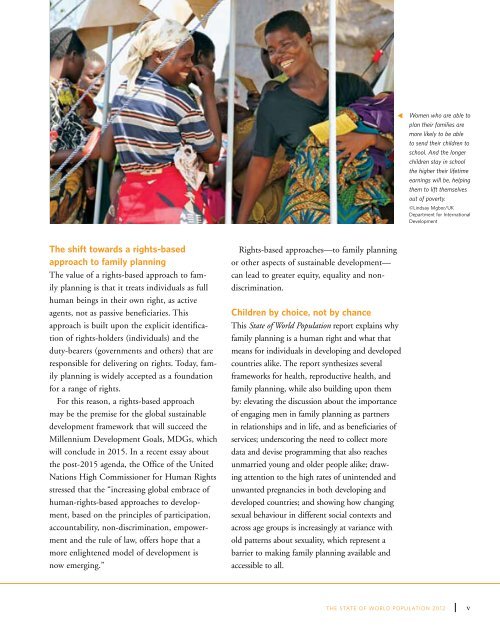State of World Population 2012 - Country Page List - UNFPA
State of World Population 2012 - Country Page List - UNFPA
State of World Population 2012 - Country Page List - UNFPA
Create successful ePaper yourself
Turn your PDF publications into a flip-book with our unique Google optimized e-Paper software.
t<br />
Women who are able to<br />
plan their families are<br />
more likely to be able<br />
to send their children to<br />
school. And the longer<br />
children stay in school<br />
the higher their lifetime<br />
earnings will be, helping<br />
them to lift themselves<br />
out <strong>of</strong> poverty.<br />
©Lindsay Mgbor/UK<br />
Department for International<br />
Development<br />
The shift towards a rights-based<br />
approach to family planning<br />
The value <strong>of</strong> a rights-based approach to family<br />
planning is that it treats individuals as full<br />
human beings in their own right, as active<br />
agents, not as passive beneficiaries. This<br />
approach is built upon the explicit identification<br />
<strong>of</strong> rights-holders (individuals) and the<br />
duty-bearers (governments and others) that are<br />
responsible for delivering on rights. Today, family<br />
planning is widely accepted as a foundation<br />
for a range <strong>of</strong> rights.<br />
For this reason, a rights-based approach<br />
may be the premise for the global sustainable<br />
development framework that will succeed the<br />
Millennium Development Goals, MDGs, which<br />
will conclude in 2015. In a recent essay about<br />
the post-2015 agenda, the Office <strong>of</strong> the United<br />
Nations High Commissioner for Human Rights<br />
stressed that the “increasing global embrace <strong>of</strong><br />
human-rights-based approaches to development,<br />
based on the principles <strong>of</strong> participation,<br />
accountability, non-discrimination, empowerment<br />
and the rule <strong>of</strong> law, <strong>of</strong>fers hope that a<br />
more enlightened model <strong>of</strong> development is<br />
now emerging.”<br />
Rights-based approaches—to family planning<br />
or other aspects <strong>of</strong> sustainable development—<br />
can lead to greater equity, equality and nondiscrimination.<br />
Children by choice, not by chance<br />
This <strong>State</strong> <strong>of</strong> <strong>World</strong> <strong>Population</strong> report explains why<br />
family planning is a human right and what that<br />
means for individuals in developing and developed<br />
countries alike. The report synthesizes several<br />
frameworks for health, reproductive health, and<br />
family planning, while also building upon them<br />
by: elevating the discussion about the importance<br />
<strong>of</strong> engaging men in family planning as partners<br />
in relationships and in life, and as beneficiaries <strong>of</strong><br />
services; underscoring the need to collect more<br />
data and devise programming that also reaches<br />
unmarried young and older people alike; drawing<br />
attention to the high rates <strong>of</strong> unintended and<br />
unwanted pregnancies in both developing and<br />
developed countries; and showing how changing<br />
sexual behaviour in different social contexts and<br />
across age groups is increasingly at variance with<br />
old patterns about sexuality, which represent a<br />
barrier to making family planning available and<br />
accessible to all.<br />
THE STATE OF WORLD POPULATION <strong>2012</strong><br />
v
















